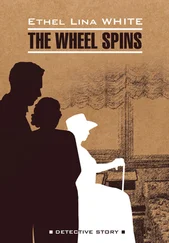"Can you help being a fool?" asked Joan unkindly.
"You asked for this story, didn't you? Now I'll outline the plot, while we're waiting to go to the bus."
Leaning against the white posts which ringed the green, Joan listened dreamily to her friend's sensational story, which foamed with melodramatic incidents. But even while she laughed at its utter absurdity, she resented it, subconsciously, as an outrage.
'What's the matter with me?' she wondered. 'Purley's really terribly funny. It's only a leg-pull. But—it's cheap.'
She was grateful when her friend grew tired, and glanced at her watch.
"Better be pushing on," she remarked. "Although I just hate to leave this."
The grass was like water-silk, mottled with bars of sunken gold and the cottages rocked through a lavender mist. Twilight was veiling the street as they walked towards the inn, but there were no lights in the village. People sat at open windows, or hung over gates, exchanging greetings and gossip with passers-by. Everyone seemed to be sharing the universal friendship of this interval 'between the lights'.
The moment of withdrawal was at hand.
Presently the novelist stopped, arrested by the sight of a dim, low, lath-and-plaster building, enclosed within a paved garden.
"Gosh, I can smell mildew," she said. "I take it, that is the oldest house in the village."
"I knew you'd make that mistake," exulted Joan. "Every tripper does. That's only a fake-antique, built from fragments of old barns, and it's got every sort of modern improvement. I love it, but the village resents it, especially as its owner is a newcomer. She's only been here eleven years."
"Who's the lucky woman?" sighed the novelist.
"Our local novelist—Miss Julia Corner."
Instantly the writer registered that automatic nonrecognition of her profession towards other members of the tribe.
"Never heard of her. What name does she write under?"
"Her own, and she does jolly well, too. She's a dear old Jumbo, with a perfectly grim sense of humour."
"Hum." The novelist thought of her own tiny mansion-flat. "Evidently, she makes virtue pay. Any special line?"
"Yes, she's the President of our local Temperance Society, and she makes the children sign the Pledge."
"Then, to pay her out for having a better house than me, I'll put her into my serial. She's a secret drinker and hides a bottle of whisky in her wardrobe. At this minute, she is lying under the bed, dead drunk."
Even as she spoke, the oaken door, white with age, was opened, and a massive figure blocked the entry, waving a teapot, in welcome.
"Come in for a cup of tea," she shouted.
"Sorry, but we're catching the bus," called Joan.
Instantly Miss Corner swayed down the flagged path to the garden gate, moving with the deceptive speed of an elephant. The writer from London saw a big red face, radiant with good-nature, bobbed iron-grey hair—cut in a fringe—and beaming eyes behind large horn-rimmed spectacles. Miss Corner wore an infantile Buster Brown blouse, adorned with wide collar and ribbon bow, and a grey tweed skirt.
"I'm just writing a short tale for the Christmas Number of a Boy's Annual," she announced proudly. "It's commissioned, of course. I take a generic interest in boys. Won't you come in and be introduced to my collaborator—Captain Kettle?"
She laughed heartily at her joke, but the source of her amusement was the stranger's painted lips and monocle. When Joan introduced her friend, she held out her big hand cordially.
"A fellow writer?" she exclaimed. "What name do you write under?"
"I'm sorry, but we mustn't stop," said Joan hastily.
"Pity," remarked Miss Corner. "I should love to talk shop. For instance, do you let yourself be grabbed by your characters, or do you go out deliberately to collect copy?"
"She's already found a story in this village," said Joan.
"Then I presume it's for your Parish Magazine," grinned Miss Corner. "Well, since you persist in going, I must return to my boys. Good-bye. Give my love to my special boy—Eros."
They heard her chuckle rumbling from behind the sweet-briar hedge as they walked away.
"What'd you think of her?" asked Joan.
The novelist did not reply, for she was suddenly gripped with overwhelming nostalgia. At that moment, London seemed so far away—a place to which she would never return. She felt as though she were being held by the village—no longer a sunset pool of beauty—but a witched, forgotten spot of whispers, and echoes, and old musty twilight stories.
"Are we far from the inn?" she asked wearily.
"No. Nearly there."
"Good. I could do with a gin-and-it."
The King's Head was a long, low, ancient building, with the faded oil-painting of some dead monarch pendant above its doorway. A faint glow from a hanging ironwork lantern flickered feebly on peeling plaster walls and tiny lattice windows. The writer flopped down on an old settle and stared out at the spread of dark silent country.
"Didn't you want a drink?" asked Joan hospitably.
"No. Desire is dead."
The friends sat in silence, which was presently broken by the novelist.
"Do people ever try to get away from here?" she asked.
"They don't want to," replied Joan. "Miss Asprey has a housemaid—Ada—who's the most beautiful girl I've seen. You'd think she'd want to go on the Stage or the Films, but her only ambition is to be Miss Asprey's parlourmaid. It would take about a ton of dynamite to shift her to Hollywood."
The writer made no comment, for her very mind seemed root-bound.
And then—suddenly—the miracle happened. Two golden sparks appeared in the distance, while a murmur vibrated through the darkness. As they watched, the lights grew brighter and larger, and then were lost in a dip of the landscape. But the hum deepened into a snarl, and round the bend of the road reeled a green monster motor-bus, with brilliant windows and the magic name 'LONDON' glowing in flaming letters.
It looked so utterly incongruous in that forsaken wilderness, as to appear unreal, like a vision of the Mechanical Age of the Future projected before the incredulous vision of some dreamer in the Past.
At the sight of it, the novelist's heart leaped in welcome. London . It reminded her that she was going back to grime and noise—to pavements and city lights. In her joy, she was swept away on a wave of insincere enthusiasm.
"I've loved every minute," she declared. "Good thing I'm going back, or the village might have got me, too."
"Too?" echoed Joan. "What d'you mean by that?"
The writer looked at her friend and was suddenly aware of the origin of her change.
"You're in love, Brooky," she said accusingly. "The village can't get you, because a man's got in first. Well, good-bye. Don't forget to tell me how my serial works out."
"I won't," promised Joan. "Shame you've got to go back."
"A shattering shame."
Joan was guiltily conscious of relief as she watched her friend climb briskly into the bus. In her turn, the novelist sank gratefully into her seat, and waved her hand in farewell. She was leaving peace and beauty, and she left them gladly. When the dark countryside began to slide slowly past the window, she watched it flow behind her, with a smile on her lips.
She was going back to London.
Joan stood before the inn and watched the motor-bus, until it had roared out of sight. Slowly the dust sifted down again, to mingle with the soil of its origin. The fumes of petrol rose higher and higher, until they were dissipated in the aether. The faint snarl of the engine sped on its journey to the last lone star.
'I'm glad old Purley's gone,' thought Joan, lighting another cigarette for company.
When she walked slowly through the village, the moon had risen and was silvering the old Tudor buildings, transforming them to ebon and ivory. Everyone had gone indoors; the lamps were lit and the blinds were drawn. Once again, the old ship rode at anchor in the dead port of Yesterday.
Читать дальше












